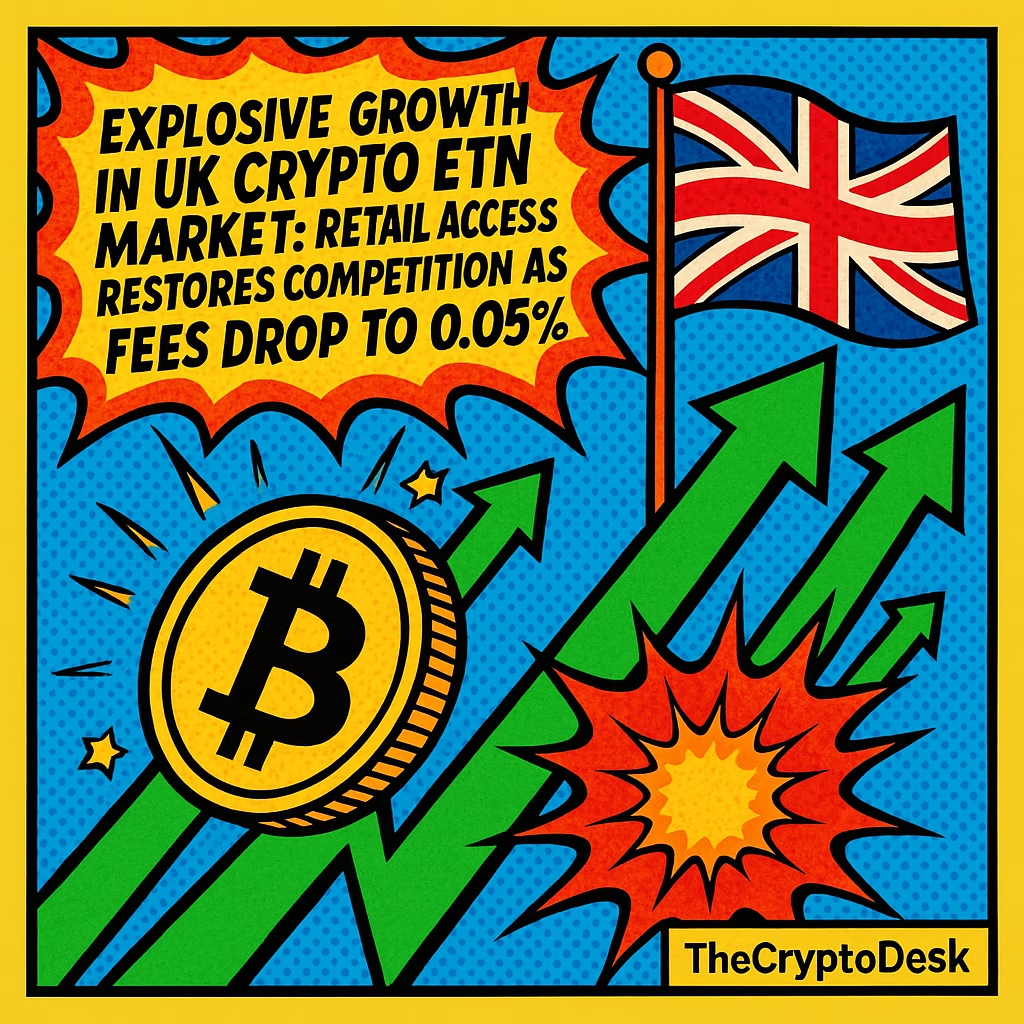In a dramatic turn of events within the UK’s financial landscape, the cryptocurrency exchange-traded note (ETN) market is witnessing a fierce price war. After more than four years of restrictions, the Financial Conduct Authority (FCA) opened the gates for retail investors to dive back into these crypto products on October 8. This pivotal moment has ignited fierce competition among major issuers, resulting in slashed fees that now rival even the most affordable traditional funds.
🚨 The UK FCA will allow retail investors to access crypto ETNs starting Oct 8—reversing a 4+ year ban.#FCA #ETNs https://t.co/aK2NkOS0Md— Cryptonews.com (@cryptonews) August 1, 2025
What does this mean for the average investor? Retail participants can now purchase London-listed crypto ETNs, which track the values of prominent cryptocurrencies like Bitcoin and Ether, directly within their tax-free stocks and shares ISAs. Starting in the new tax year from April 6, these ETNs will also be eligible for the Innovative Finance ISA, making them even more appealing.
The FCA’s landmark decision has already sparked a flurry of activity among crypto asset managers, who are eager to attract investors back to the market. For instance, Bitwise was quick off the block, dramatically cutting the annual fee for its Core Bitcoin ETP from 0.2% to an astonishing 0.05%. This aggressive move pushed competitors like 21Shares to reduce its fees for its Core Bitcoin and Ethereum Core Staking ETPs down to 0.1%. Fidelity responded by decreasing its Physical Bitcoin ETP fees to 0.25%, while Invesco followed suit, matching the 0.1% fee until the end of 2025.
Not to be outdone, BlackRock—the behemoth of the U.S. crypto ETF arena with its $92 billion iShares Bitcoin Trust—entered the UK fray by listing its European iShares Bitcoin ETP in London, offering a limited-time fee reduction from 0.25% to 0.15% until January. Meanwhile, CoinShares continues to stand out in the Ethereum sector with its innovative Physical Staked Ethereum ETP, which boasts zero management fees thanks to the staking rewards from locked Ether.
This race to the bottom in fees echoes what was witnessed in the United States when crypto ETFs debuted in early 2024. Analysts suggest that these sharp cuts make it potentially cheaper for investors to gain exposure to Bitcoin through these regulated funds than via many traditional investment vehicles. It’s worth noting that some older crypto ETNs—previously only accessible to professional investors—still charge exorbitant fees of up to 2.5% annually, which highlights the growing disparity in this rapidly evolving market.
Trading volumes have surged dramatically since the FCA reopened access. According to data from Bitwise, average daily trading volumes for Bitcoin ETNs on the London Stock Exchange skyrocketed from $2.1 million to $7.2 million shortly after the announcement. Ether ETNs enjoyed a similar rise, increasing their volumes from $1.9 million to $4.4 million. Notably, WisdomTree’s Physical Bitcoin and Ethereum ETNs have recorded the highest turnover since the relaunch, closely followed by iShares products. Russell Barlow, CEO of 21Shares, remarked on the surge, noting it underscores the intense appetite for exposure to these digital assets.
However, amidst this excitement, the FCA is warning issuers to proceed with caution. In a recent statement, the regulator emphasized the need for responsible practices, advising firms against offering excessive incentives to attract investors. They also highlighted the importance of strict appropriateness assessments, urging firms to provide risk warnings and cooling-off periods, reiterating that crypto ETNs are still high-risk instruments not protected by the Financial Services Compensation Scheme.

Source: UK FCA
Several platforms, including Interactive Investor and Trading 212, are welcoming retail investors into this exciting market, while notable players like Hargreaves Lansdown and AJ Bell have yet to embrace crypto ETNs fully. Hargreaves Lansdown has expressed skepticism, cautioning clients against including Bitcoin in portfolios, describing it as “not an asset class.” Nevertheless, the firm intends to open up trading for “appropriate clients” by early 2026.
The FCA’s progressive stance represents a significant milestone for the UK crypto sector, which has faced criticism for its sluggish regulatory advancements. Recently, the regulator has sped up the approval process for crypto firms, increasing its acceptance rate to 45% and granting licenses to major institutions like BlackRock and Standard Chartered.
⚡UK’s Financial Conduct Authority is speeding up crypto approvals after years of criticism, clearing five firms since April. #UK #CryptoMarket https://t.co/BrMK9UoQNb— Cryptonews.com (@cryptonews) September 22, 2025
Market research from IG Group is also noteworthy, suggesting that the influx of retail access has the potential to expand the UK’s crypto investment market by up to 20%. Almost one in three adults in the UK have shown an interest in exploring digital assets through ETNs, with the strongest enthusiasm coming from younger investors aged 18 to 34. These individuals cite the benefits of regulation, safety, and tax efficiency as key attractive factors.
As the dust settles on this groundbreaking policy change, one thing is clear: the UK’s crypto landscape is on the verge of transformation. With the door now wide open to retail investors, the implications of this move could reshape the market landscape for years to come, encouraging both innovation and competition. In this rapidly evolving space, what lies ahead for investors and issuers alike remains an intriguing question.
